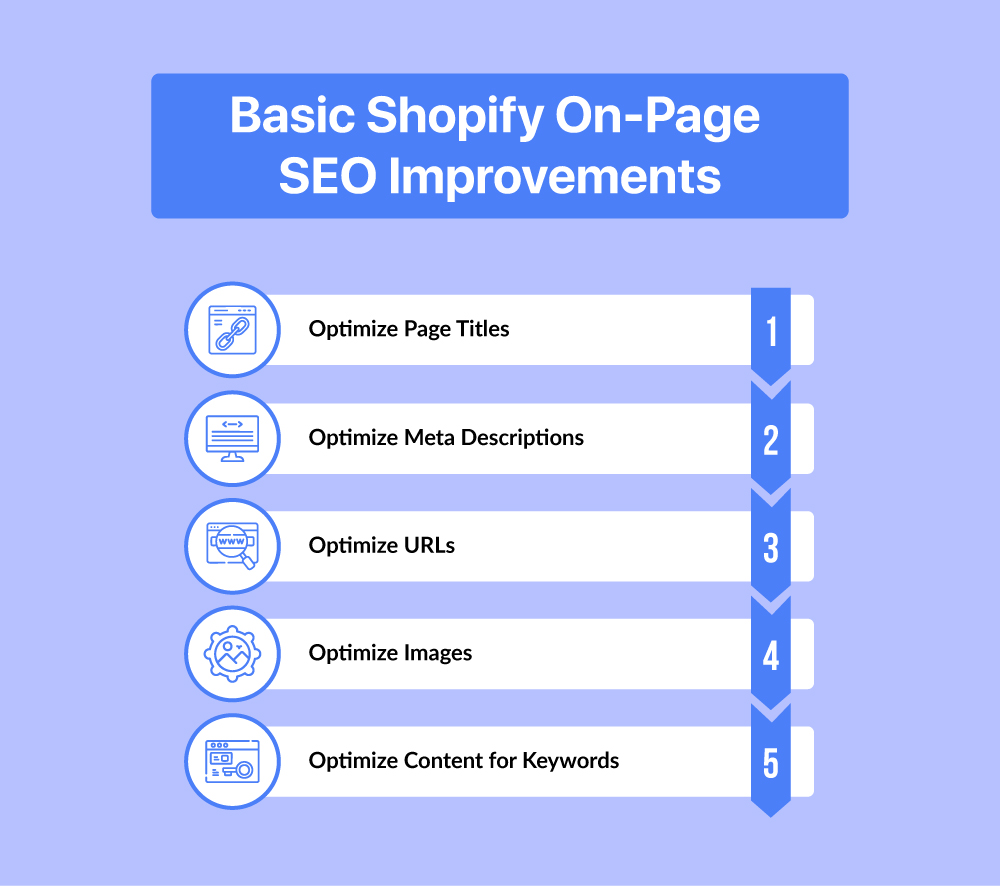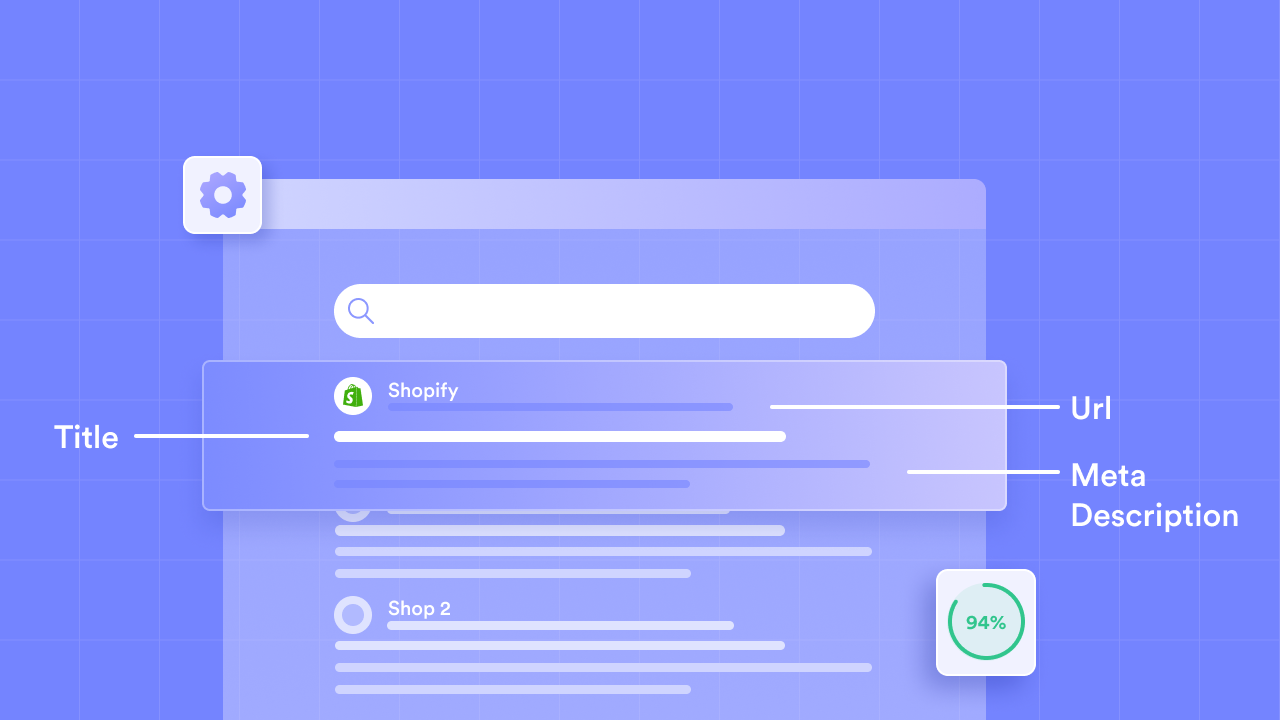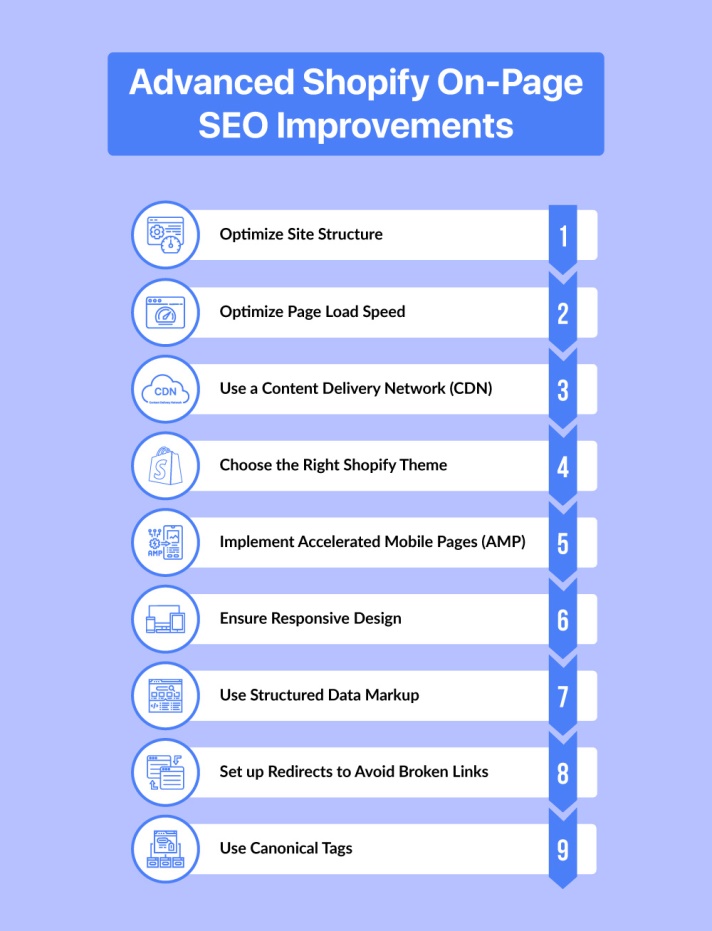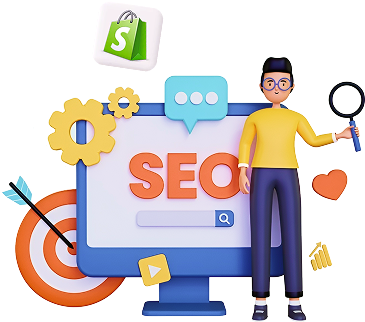
Top Rated Shopify SEO Agency
Shopify enables businesses to manage operations simultaneously on digital platforms and physical stores while controlling mobile sales through its system. Shopify delivers a customizable interface with its user-friendly checkout process and complete set of tools for inventory management and customer administration as well as order and shipping management. Small businesses seeking eCommerce success should pick Shopify because of its rich collection of features along with diverse integration capabilities.
AN SEO AGENCY specializes in optimizing Shopify websites to improve rankings, visibility through optimization that will generate organic traffic and increase conversion rates. Consult with our expert Shopify SEO staff to achieve maximum success for your Shopify store.
Why SEO Matters for Shopify Store?
The high placement of your Shopify store on search engine results pages (SERPs) is essential through Search Engine Optimization (SEO), thus making your products accessible to potential customers. The absence of SEO means your store will disappear among the billions of online businesses, thereby decreasing your visibility and sales potential.
Research indicates organic search drives 38% of website visits to eCommerce stores and generates 57% of their revenue. SEO produces long-term, cost-effective traffic as a result of its differences from paid advertising that demands continuous investment. Shopify stores optimized properly will draw targeted users and better their search experience to convert visitors into sales.
The execution of a powerful SEO plan allows your Shopify store to achieve the following benefits:
Your eCommerce website will rank in the first position of Google’s search results for targeted search terms.
- Your SEO initiative drives customers with strong purchase intentions that result in more successful transaction outcomes.
- Establish brand authority and credibility.
- The application of reduced expensive paid advertisement practices.
- The website performance, along with mobile experience, will benefit from optimization.
Your business performance will suffer and competitor absorption will occur if you do not focus on SEO. The investment in Shopify SEO leads e-commerce businesses towards enduring expansion along with long-term triumph in aggressive market sectors.
How Well Does Shopify Support SEO?
Within its platform, Shopify provides numerous built-in features that optimize your store for better search engine ranking. The built-in features of Shopify contain several important components:
- Customizable Meta Tags – The platform enables customers to personalize their Meta tags, which helps bring in improved click-through rates.
- SEO-Friendly URLs – The system produces user-friendly URL structures that enhance search engine indexing capabilities.
- Automatically Generated Sitemaps – The system creates automatic sitemaps that support efficient crawling and indexation from search engines.
- Mobile Optimization – Ensures a seamless shopping experience across all devices
- Free SSL Certificate – The website security and trustworthiness increase through the availability of a free SSL certificate.
- Image Alt Tags – The correct usage of image alternative tags results in better rankings within Google Image Search results.
The basic infrastructure from Shopify is solid, but users need additional tools to develop a complete SEO solution. Some key restrictions flow from Shopify, which include duplicate content problems as well as restricted URL structures and limited blogging functions.
Your store achieves higher SEO positions through the implementation of additional strategy points, which include:
- Keyword Research & Optimization – Selecting appropriate keywords through research and optimization allows merchants to enhance product pages together with content.
- Technical SEO Enhancements – The enhancement of technical SEO requires store owners to fix website speed problems while optimizing their navigation structure and fixing broken internal links.
- Content Marketing – The strategy of Content Marketing involves developing premium blog content with educational guides to build up website visits.
- Backlink Building – Your website’s domain authority gains strength through getting links from reliable sources for backlink building.
- Structured Data & Rich Snippets – Structured Data enables merchants to add enhanced information as Rich Snippets, which makes their product listings more visible within search engine results.
When you refine these aspects, your Shopify storefront will obtain higher ranks, which allow you to attract more potential buyers to boost your overall sales results. Your Shopify store has the potential to reach its maximum potential with an expert Shopify SEO agency who will lead you past the competition.


How We Optimize On-Page SEO for Shopify?
On-page elements in your Shopify store demand optimization since they determine both search rankings and organic visitor traffic. Code quality and text optimization and picture optimization and HTML tag optimization and site usability enhancement comprise the aspects of on-page SEO. The optimization of your controllable elements ensures strong search results for your store.
Basic Shopify On-Page SEO Improvements

1) Optimize Page Titles
Both page titles need to captivate readers by using naturally integrated keywords to generate clicks. The full title of your page should remain below 60 characters to ensure it appears in full on search results. Main keywords must lead all page titles and each page should contain only one H1 tag since Shopify uses page title contents as default headings.
2) Optimize Meta Descriptions
Meta descriptions must contain keywords along with an engaging message, which should be shorter than 155 characters. Highlight the uniqueness features that include free shipping together with discounts as incentives for buyer action. When written correctly, Meta descriptions help websites rank higher as well as attract more user engagement.

3) Optimize URLs
Online shop URLs at Shopify need to maintain a brief yet descriptive structure that excludes superfluous words throughout the addresses. You can modify page titles and Meta descriptions together with URLs through the “Search Engine Listing Preview” section of Shopify.
4) Optimize Images
Enhanced image optimization supports website speed and enhances search engine optimization effectiveness. Names of images should carry useful descriptions, while you add appropriate text descriptions known as alt text to reinforce both search engine results and user experience. Natural occurrence of keywords should exist in both the file naming structure and image description tags. Both search engine and screen reader users who depend on screen readers gain benefits from image optimization procedures.
5) Optimize Content for Keywords
All web content including, product descriptions and articles should be optimized with keywords throughout blog posts as well as pages about us and product descriptions. The content should utilize primary and secondary keywords in parallel to normal reading patterns. Write keyword-rich extensive content that includes guides and articles in order to reach different search needs.
Advanced Shopify On-Page SEO Improvements

1) Optimize Site Structure
The combination of well-structured information helps users achieve better experiences while search engines gain easier access to page crawling and index creation. The hierarchical organization for Shopify online stores should remain straightforward.
Homepage → Collections → Products
Homepage → Blog → Blog Posts
Avoid deep navigation structures. Users should find all products reachable by making just a couple of clicks from the homepage. A global search element should be added as part of the navigation system.
2) Optimize Page Load Speed
The speed with which pages load becomes an important component that Google uses to determine search engine rankings. The speed at which stores load determines how many visitors bounce away, thus leading to decreased rankings. The following steps serve as the key path to boost load speed:
- Minify CSS: Reducing the CSS file size becomes possible by cutting out redundant characters from the files. A file extension change to .scss.liquid enables Shopify to auto-minify CSS files that are called as .scss.css.
- Optimize Images: Users can optimize their images through the use of Shopify apps that include the Plugin Speed Optimizer.
- Lazy Load Images: It functions by delaying images until customers scroll to view them to improve performance.
3) Use a Content Delivery Network (CDN)
Shopify integrates its built-in CDN from Fastly to achieve rapid content delivery for users. The stylesheet must reference image assets through asset_url so automatic CDN updates become active.
4) Choose the Right Shopify Theme
Your site speed depends on the themes, while users’ experience is enhanced or deteriorated based on them. First, conduct performance tests of new themes through GTMetrix testing. Avoid bloated themes, which includes numerous functions that lead to slower performance, should be avoided by shop owners.
5) Implement Accelerated Mobile Pages (AMP)
Mobile devices generate more than half of all visitors to stores. AMP speeds up mobile page loading times. Store owners can connect AMP technology to their Shopify store through the “AMP by Shop Sheriff” application for better mobile usage and search rankings.
6) Ensure Responsive Design
Having a mobile-friendly design represents an essential requirement for SEO improvements. One must test every page because Shopify themes feature automatic responsiveness yet readers might encounter improper viewing or usability on different screen sizes.
7) Use Structured Data Markup
Search results become more appealing when structured data (schema markup) adds rich snippets to them. The following schema types constitute mandatory elements for Shopify stores:
- Product Schema: It shows buyers essential product details, which include price information alongside availability status and review sections.
- Breadcrumbs Schema: It acts as a tool that provides both users and search engines with better comprehension of site navigation pathways.
- Article Schema: It works as an optimization tool for Google Discover traffic of blog content./li>
- FAQ, Recipe, Event, and Video Schema: Enhances search visibility for specific content types.
Shopify users who to create structured data can easily implement it through the “JSON-LD for SEO” app even without advanced technical skills.
8) Set up Redirects to Avoid Broken Links
Establish redirects through your system to prevent broken links from appearing.Broken links hurt SEO. Redirect pages that need removal to acceptable existing pages in preference to the homepage. Shopify users should use the “URL Redirects” tool for setting up 301 redirects when adjusting their URLs.
9) Use Canonical Tags
SEO canonical tags serve to eliminate duplicate content problems in your website.Search engines find duplicate content confusing, which results in divided ranking power between the pages. Verify that Shopify has correctly assigned canonical tags to main product pages since the platform generates these automatically.
Our Team Leads
How We Improve Shopify OFF-Page SEO?
Your website gains credibility together with increased traffic and SERP rankings through off-page SEO practices that occur outside your website domain. Google reports that off-page SEO approaches constitute a vital requirement for Shopify store success since the search engine examines trust as well as authority and relevance development.
1. Build High-Quality Backlinks
The ranking of your store heavily relies on backlinks, which represent external website links that point to your store. Rankings are determined by the link quantity, together with their value and connection to related search topics, according to Google. Your store will receive better trust and authority from Google through high-authority websites linking to your store.
Effective Link-Building Strategies:
i) Guest Posting on Industry-Relevant Blogs
Your search engine visibility increases through publishing top-notch content on respected domain websites, which generates backlinks to your store. You should develop SEO-friendly content that delivers value to readers and automatically leads them toward your Shopify store.
ii) Blogger & Influencer Outreach
When you partner with influencers and bloggers who operate within your business sector, you can access their audience. Through offers of complimentary products and affiliate commission and sponsorship opportunities, brands can gain product evaluations and unboxing video promotions and brand references.
iii) HARO (Help a Reporter Out) for Media Mentions
HARO serves as an online platform that enables journalists to find expert opinions, so businesses should sign up to access this resource. Quality input can secure your features on Forbes alongside Business Insider or major industry publications to drive both referral traffic and SEO improvement.
iv) Content Promotion & Outreach
You should develop meaningful content materials like complete guides and case studies and interactive charts, which you can submit to newspapers and online magazines for publication. The higher the interest value of your content you will obtain more backlinks.
v) Link Reclamation & Broken Link Building
- Link Reclamation: Use SEO tools to locate brand mentions without links, which you should request publishers to turn into linked mentions.
- Broken Link Building: Your Shopify store can fill broken links on appropriate websites while receiving mutual advantages through a broken link suggestion setup.
vi) Participate in Relevant Forums & Communities
Participate actively in Reddit along with Quora and select Facebook discussion groups related to your industry. Use your store links in your responses whenever you contribute useful information to maintain their value. The promotion of your store through self-promotion must always avoid spam tactics since you should focus on generating real value first.
vii) Local Citations & Business Directories
A list of your Shopify store in established directories with high ranking status, including:
- Google My Business
- Yelp
- Bing Places
- Trustpilot
2. Leverage Brand Mentions & Social Signals
Brand mentions that receive no link back to your website still strengthen your website’s authority. The brand signals that Google detects function as trust indicators in its evaluation process.
- Monitor Competitor Mentions: You can locate and duplicate authoritative mentions through Ahrefs, along with SEMrush or Moz for competitor mention tracking.
- Encourage Press Coverage: Establish network connections with media professionals by distributing official press announcements.
- Get Featured in Industry Roundups: Experts Receive Industry Attention Through Their Contributions To Expert Analysis Lists And Opinion Pieces.
- Leverage Customer Reviews: Customers should review the brand through channels including Google, Trustpilot and social media platforms.
- Engage on Social Media: Every social media post you release should contain high-quality content, and you should create contests and enable users to share their content.
- Use Social Proof: Rephrase the following sentence. Maintain direct flowing text and normalize verbalization.
3. Optimize for Local & International SEO
These strategies will boost visibility of specific target areas:
Google My Business (GMB) : Requires NAP details to be identical, while users should upload professional images and reply to all customer reviews.
Multilingual SEO: The implementation of both hreflang tags alongside country-specific domain names enables successful optimization for various regions.
4. Maximize Content Marketing for SEO Growth
Exceptionally good content produces both supplementary backlinks and natural website traffic.
- Create Evergreen Blog Content: Develop permanent blog material through writing SEO-friendly posts that address the main customer questions.
- Develop Share-Worthy Infographics: Infographics alongside reports should be designed to inspire sharing between users for increased backlinks and engagement.
- Start a YouTube Channel: Begin a YouTube Channel to demonstrate products while offering tutorials alongside customer video endorsements.
- Launch Podcasts & Webinars: Recording expert-led podcasts together with webinars helps organizations create authority using specialist discussions.
- Publish Whitepapers & E-books: Whitepapers and E-books available for download serve to attract more customer participation.


Shopify SEO Problems & How to Fix?
As strong e-commerce software, Shopify provides many useful functions, yet it has specific restrictions on Search Engine Optimization capabilities. Many problems with Shopify can be solved or avoided.
1. Title Tag Character Limits
The title tags Shopify permits extend to 70 characters, yet Google inspects them in pixels, which surpasses the character limit. To achieve optimal results, the recommended width for pixels is 600 (corresponding to 60 characters).
Fix:
- You can determine potential SERP title truncation by using preview tools.
- You should maintain short titles that place essential keywords at the forefront.
2. Forced URL Structure
Shopify implements an automatic URL structure addition of “/products/” and “/collections/”, which produces extended URL length.
Fix:
- Shopify uses proper canonicalization methods to help search engines detect its official URL versions.
- Internal links, along with breadcrumb navigation, will improve user movement throughout the website.
3. Robots.txt File Editing
Shopify users received the ability to modify robots.txt directly after not permitting it before.
Fix:
- Navigate to Online Store > Themes after logging into the Shopify admin. Select Actions > Edit Code to access the robots.txt liquid file within your theme.
- Within your Shopify admin, navigate to Themes under Online Store to access the desired page view.
- Click Actions > Edit Code.
- Develop a new template file for robots.txt before making necessary changes to the content.
- The application of custom directives happens after saving the changes made to the file.
4. Image Alt-Text Limitations
For each image, you need to enter alternative text details on Shopify even though the image appears on multiple pages.
Fix:
- The Shopify App Store contains bulk image alt-text applications that you can utilize.
- Make sure you implement a clear system for how names should be organized since it will simplify your alt-text updates.
5. Duplicate Content from Product Variants
Shopify generates several URLs for its product variants, including the various color and size options, yet this technique can activate duplicate content issues.
Fix:
- A canonical tag should be added to establish the main product page.
- All structurally identical variants must be displayed on a single product page.
Shopify SEO Checklist
The Shopify store can obtain major traffic and sales growth by enhancing its search engine visibility. An SEO checklist developed by us serves to make store optimization more straightforward through a practical step-by-step process.
Essential On-Page SEO Tasks
- A page should include only one H1 tag to maintain proper structure.
- Develop attention-grabbing page titles, keeping the length below 60 characters.
- Write attractive Meta descriptions that remain under 155 characters.
- Your URLs should receive optimization regarding keywords as well as clarity of presentation.
- Each image needs both alternate text descriptions and names that contain relevant keywords.
- You should create important long-form content that includes how-to instructions, blog articles, along list-style guides.
- Register all page components beneath your focused keyword specifications.
Building Authority with Off-Page SEO
- Backlink acquisition from quality sources allows you to strengthen your website domain.
- Your media security should be established while you collect customer feedback
Boosting Performance with Technical SEO
- Submit your XML sitemap through the Google interfaces.
- Design a website structure that enhances search engine crawling operations
- The web page should load quickly, thus optimizing its performance.
- The implementation of AMP (Accelerated Mobile Pages) serves as an appropriate solution.
- Your website must have a mobile-friendly design alongside responsive characteristics
- Search and resolve any cases of duplicate content across the website
- The addition of structured data markup will improve search appearance by providing useful information to search engines.
- Establish proper 301 redirect rules whenever you move pages or eliminate them.

Shopify SEO Tools
Enhancing search engine visibility for your store presents simple approaches that will help your business succeed. The tools presented here, along with quick optimization strategies, will assist you in maximizing important sections of your Shopify store to attract organic traffic.
1) Make Your Homepage SEO-Ready
The initial page the user encounters becomes the establishment for how your brand represents itself to all visitors and search engines. The optimization of your homepage creates better visibility that leads your entire store to achieve SEO success.
- Utilize one H1 title which includes your principal keyword for the page content.
- Your title should have an intro paragraph that contains keywords repeatedly.
- Your website needs a distinct, deep Meta description that should be optimised for SEO purposes.
- Natural integration of broad keywords and their related terms occurs throughout the content.
2) Turn Collection Pages Into SEO Assets
The collection pages of your site are perfect for focusing on category-based and extended-word keyword opportunities. Make them powerful by:
- Companies should create original content that prevents matching content across different websites.
- Long-tail key phrases should be used when grouping products.
- Multiple descriptions with bullet points along with keyword emphasis should be included within the content.
3) Turn Blog Content Into a Traffic Magnet
The use of a blog enables you to establish authority in a specific field while creating valuable internal link structures. Here’s how to make it count:
- Prioritize quality over quantity.
- You should maintain continuous posting with at least two comprehensive articles published every month.
- Create text that presents original content with practical use while maintaining proper structure.
- Add links between product and collection pages inside your website content.
- Direct visitors to action through decisive CTAs
4) Plan a Smooth SEO-Friendly Migration to Shopify
Platform changes usually affect your rankings, yet proper strike planning enables you to preserve your position effectively.
- All modified URLs require the implementation of 301 redirects.
- Double-check robots.txt and sitemap rules
- The new sitemap should be submitted through Google Search Console.
- Retain your original site structure where possible.
- You should resolve duplicate content problems by implementing canonical tags.
- Monitor and resolve 404 errors post-migration
Pro Tip: Use tools like Cart2Cart for streamlined migrations with auto-redirects.
Leverage Log File Analysis for Technical SEO Insights
The knowledge about search engines’ site crawling procedure enables you to explore any overlooked possibilities. Through Server-like logs that Cloudflare provides, users can acquire important insights independent of direct server log access from Shopify.
- Activity logs display user interactions, but these actions do not help with SEO optimization.
- Server-style logs can be accessed through Cloudflare by using its capabilities for log inspection.



























Shopify vs. Other CMS Platforms:
Which Is Best for SEO?
Shopify fares relatively to other CMS platforms for SEO when building an online store by considering this brief comparison.
-
Shopify vs WordPress SEO
The combination of WordPress with WooCommerce delivers powerful, advanced SEO benefits because users can customize and use a range of plugins to meet their needs. Users need thorough expertise in order to manage the system efficiently.
-
Shopify vs WooCommerce SEO
WooCommerce enables store owners to maintain comprehensive control over large stores. Shopify provides a platform that enables beginners to use it effortlessly while delivering automated SEO features, which makes management more straightforward.
-
Shopify vs Squarespace SEO
The SEO tools that Squarespace provides come with a minimalist interface structure while still remaining restricted in its ability to offer advanced optimization features. Shopify excels more in the fields of structured data management and eCommerce-specific tools and app integration options.
-
Shopify vs BigCommerce SEO
These two platforms excel equally well for SEO purposes. BigCommerce features a better native feature set, but Shopify stays user-friendly and grants simple SEO capabilities for typical web administrators through its expanding app market.
So, what’s the Verdict?
As long as you develop a suitable SEO plans, you can succeed in ranking on any of the major platforms that have fundamental SEO capabilities. The ease-of-use, alongside quick implementation and adequate technical SEO features, makes Shopify stand out as an excellent platform.
Shopify sees itself as an excellent SEO solution for users seeking fast platform deployment and efficient growth potential.
Need Help With Shopify SEO?
The team at AN SEO AGENCY uses its expertise in Shopify SEO services to help online stores enhance both their visibility and conversion rate. The technical maintenance will be handled by our team so that you can focus on business growth.
Want to compare platforms? Our SEO analysis contains information about BigCommerce, Magento and WooCommerce plugins.
Client Testimonials
about Our Digital Marketing Services.
- 363 Google Reviews
-
5.0

I believe that engaging the services of AN SEO AGENCY as my partner was the key to unlocking growth for my business. As for the strategies for the Google Ads and content, Ryan managed to increase the traffic and conversion rates highly. This group has been very open and posted updates often while working on the assignment.

Anyway, I collaborated with AN SEO AGENCY for an influencer marketing campaign, and I’m more than satisfied with the results. The influencers that were assigned to me were wonderful for my product, and generally, the campaigns contributed to an increased clientele base.

When it comes to AN SEO AGENCY, my experience is excellent. Sometimes I required ORM (Online Reputation Management) services because several bad comments affected my business. Their team was very fast to respond; they developed positive campaigns that enhanced my brand reputation.

With regards to my SEO and content marketing, I have been collaborating with AN SEO AGENCY, and their team is great! Now my authored website manages to be ranked on the first page for several key terms, and the content provided is nice and perfectly optimized. That is the only place I know that gets close to actually understanding the complexities of digital marketing.

When it comes to PPC campaigns, I hired the services of AN SEO AGENCY who did a great job on my accounts. Their experience with Google Ads made it even possible to give me a lot of returns on investment within the given limit. They are always on the go and they update me on how my campaigns are faring. Highly recommended!

I contacted AN SEO AGENCY for brand creation services and I did not expect much, but they over-delivered. They did everything from creating a beautiful logo and making sure that my brand had a clear and coherent look on the web. It was great working with them

AN SEO AGENCY has been into Meta Ads for so long and has done it perfectly. They came up with campaigns that appealed to my audience in a very special way. The outcome was not a long one – public engagement skyrocketed and the sales figures were not lagging far behind. I am personally very happy with their work, couldn’t be happier.

I sought the services of AN SEO AGENCY for SEO and content marketing services and I am not regretting it. I have also seen my website’s ranking increase and the content they offer is good and impressive. An effective agency that provides quality service repeatedly.

My start-up company got assistance on SEO, PPC as well as influencer marketing from AN SEO AGENCY. It proved beneficial and this can be evidenced by a consistent increase in leads and better online visibility. They are the most professional and dedicated team that I would recommend to any business.

AN SEO AGENCY gave me a new perspective on digital marketing. They have worked on everything from Influencer campaigns to ORM and SEO and are fluent in all four. The team is dedicated, professional and genuinely interested in the success as much as the client. Couldn’t ask for more!




Popular Articles
our articles and blog platform.
No posts found in this category.
Frequently Asked Questions (FAQ)
1. Is Shopify good for SEO?
The platform allows SEO-friendly operations and uses features that enhance search engine ranking for stores.
2. What are the best SEO apps for Shopify?
The most effective Shopify SEO apps consist of Plug-in SEO and Smart SEO, along with JSON-LD for SEO and TinyIMG.
3. What actions should I take to speed up my Shopify store's performance?
The store will benefit from compressed images, the removal of unused apps, and a lightweight theme enabling lazy loading functionality or a content delivery network operation.
4. Does Shopify support schema markup?
Shopify provides two options to add structured data, either manually or through apps, which enhance visibility while generating rich results.
5. What SEO mistakes should I avoid on Shopify?
The fundamental elements to avoid in building an SEO-strong Shopify store include duplicate content, together with missing meta tags and optimized images, along with broken or missing redirects.
6. Can PPC help boost my Shopify SEO results?
Google Ads and similar PPC initiatives create fast traffic entries that help brand awareness development and foster lasting SEO performance.
7. How can I improve my SEO faster?
The implementation of SEO needs 3–6 months minimum to produce substantial outcomes. AN SEO AGENCY provides specialized Shopify SEO services to businesses that want improved search rankings combined with higher traffic levels and enhanced sales results.
Platform We Work With
Industries We Work With
-
- SEO For Accountant
-
- SEO For Architects
-
- SEO For Artists
-
- SEO For Astrologers
-
- SEO For Automotive
-
- SEO For Baby Products
-
- SEO For Bakeries
-
- SEO For Car Dealerships
-
- SEO For Car Rental Service
-
- SEO For Car Wash Services
-
- SEO For Casino
-
- SEO For Chiropractors
-
- SEO for Churches
-
- SEO For Clothing Boutiques
-
- SEO For Cosmetic Physician
-
- SEO For Dentists
-
- SEO For Doctors
-
- SEO For Dog Trainers
-
- SEO For Electricians
-
- SEO For Fashion
-
- SEO For Financial Services
-
- SEO For Fintech
-
- SEO For Flooring Contractor
-
- SEO For Florist
-
- SEO For Gyms & Fitness Clubs
-
- SEO For Hair and Nail Salons
-
- SEO For Healthcare
-
- SEO For Home Cleaning Services
-
- SEO for Travel and Tourism Agency
-
- SEO For Hotels
-
- SEO For HVAC Contractors
-
- SEO For Immigration
-
- SEO for Personal Injury Lawyers
-
- SEO For Interior Designers
-
- SEO For Landscapers
-
- SEO For Laser Clinic
-
- SEO For Lawyers
-
- SEO For Movers and Packers
-
- SEO For NGO
-
- SEO For Optometrists
-
- SEO For Pest Control Services
-
- SEO For Pet Groomers
-
- SEO For Pet Supplies
-
- SEO For Photographers
-
- SEO For Physical Therapists
-
- SEO For Plastic Surgeons
-
- SEO For Plumbers
-
- SEO For Real Estate
-
- SEO For Restaurants
-
- SEO For Roofing
-
- SEO For SAAS
-
- SEO For Salon
-
- SEO For Security Companies
-
- SEO For Solar Installers
-
- SEO For Staffing & Recruitment
-
- SEO For SPA
-
- SEO For Tattoo Studios
-
- SEO For Wedding Planners
-
- SEO For Yoga Studios
-
- Click For More Industries















